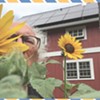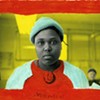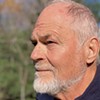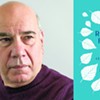Published January 31, 2001 at 3:40 p.m. | Updated October 21, 2015 at 10:44 a.m.
Geof Hewitt’s passion for poetry began when his high school English teacher gave him a C-minus for trying “to out-Shelley Shelley.” The funny part, Hewitt says, was that he had been attempting “to out-Poe Poe.” But some 40 years and a half-dozen books later — including the latest, Only What’s Imagined — the clever Calais resident has managed to outdo himself, over and over again.
Indeed, few things are what they seem with Hewitt. More wry than shy, he prefers to let his verses — as in the autobiographical poem, “Syllables” — reveal his “state” of mind:
The people of Vermont? You’ll know them
one or two at a time, not through annual Town Meetings
or around a single ritual like sugaring or potluck dinners,
and they’ll fool you.
Suitably, Hewitt is most proud of an “honorary doctorate” awarded him by elementary school students after a month-long residency at the Monroe School in Boise, Idaho. And the boyish 57-year-old would rather perform in poetry slams than converse about the literary process with academics. “There are some very, very good poets in Vermont that wouldn’t be caught dead slamming,” Hewitt says of the urban-styled performance art that made its way to Vermont about a year and a half ago. “It’s more barroom than library.”
Slamming got its start in Chicago during the mid-’80s when Mark Smith, a construction-worker-cum-poet, grew bored with the austere readings he attended. It occurred to him that poetry should read more like a rock ’n’ roll concert or sporting event, complete with cheers and jeers.
Smith’s poetry slams ignited imaginations around the country, Hewitt’s included. Pitting his deadpan, sardonic style and relatively traditional puns against more raucous, rap-style performers earned him a slot as an alternate — a noticeably older one — on Vermont’s National Poetry Slam Team last year.
“He’s brilliant in that he can be funny, touching and insightful without resorting to the verbal pyrotechnics of other slammers,” offers Seth Jarvis, a local slam master. “He’s got a signature pause at the opening of his pieces that gets complete command of audiences. There’s a maturity to his work that gives us something to aspire to.”
Hewitt would rather not say what other poets he admires, even though he’s been compared to Robert Frost. In “Syllables,” he ridicules that analogy:
Though every generation claims its share of Frosts,
the only real or self-appointed Frost was Robert Frost himself.
Anyway, you need a name for an accolade?
Following his own “road less traveled,” Hewitt even refuses to call himself a “poet” — despite the fact that Doubleday found him qualified to edit Quickly Aging Here: Some Poets of the 1970s, and Garrison Keillor recently read one of his poems on National Public Radio’s “The Writer’s Almanac.”
“I don’t want to be associated with that word,” Hewitt says, dismissing “the glorification of a rarified art.” He concedes, though, that what he writes are indeed poems. He blames bad teaching for making people think “that poems are more important than their readers,” and for poetry’s bad rap in general in the classroom.
Only What’s Imagined, 74 pages of poems about the irony and ecstasy of living in rural Vermont, is a self-published collection that comes with a money-back guarantee if readers explain their displeasure — so far, no takers. In its introduction, Hewitt’s mentor and friend Hayden Carruth — a National Book Award winner for his poetry and former resident of Johnson — helps explain the author:
“No environment could have been better chosen for fostering Hewitt’s special talents. He is a man of wit, even a jokester, in the best tradition of New England slyness and sardonicism…he is close to nature but delights in nature’s improbabilities.
“I’ve never known anyone so inventive, so full of good-natured rage, so antic in his refractoriness, and yet so gentle,” Carruth continues. “He could puncture our sentimentality and leave our sentiment intact.”
For his part, Hewitt criticizes his own poems as too conversational, not “poetic” enough. In “The Kind of Poetry I Like,” he reveals what he doesn’t like about his beloved genre:
I told him I think poetry is the language
that shares experience, not what is beautiful,
and I don’t think I can use “moon” in my poems,
Of course, explaining it in a poem is kind of creepy
I’m delighted someone would read this far,
and I never believed he’d listen:
each word a new chance
not to abuse an old cliché,
ot to construct self-conscious language
not to be beautiful, not to confound
not to take a risk, not to discover, share,
not to be mystical,
that was what I was not writing for these days!
And I was sure depressed about it all.
I told him I’d published in a magazine.
“Resting on your laurels, eh?” he said.
Resting is the last thing on Hewitt’s mind, although he’s already earned enough distinctions to consider slowing down. The New Jersey native studied under some great “famous and not famous” poetry teachers as an undergraduate at Cornell, where he produced Poem & Other Poems under his own Kumquat Press in 1966. Hewitt then borrowed that moniker for Kumquat, a small poetry and photography magazine that published his work and others’, including Carruth’s. In 1974, Ithaca House printed Hewitt’s first book-length collection of poems, Stone Soup, and his second, Just Worlds, in 1989. Both were met with modest sales and eventually went out of print.
Hewitt attended a year of graduate school at Johns Hopkins, where he studied under renowned poet Elliott Coleman. He then spent 1967 through 1969 getting a Master’s in Fine Arts at the University of Iowa. After a year of teaching at the University of Hawaii, he came to visit a brother in Burlington and wound up buying a dilapidated farmhouse in Enosburg in 1970.
In “The Country Poet,” from Only What’s Imagined, Hewitt shares his preference for the earthy reality of farm life over the surreality of a writer’s art:
I envy Stanley his hourly wage and the end of his day
of working for other men. He comes home
& tells the family, “Soon we are going to buy a farm.”
I think I’ll hire out as the trusty hand!
What heaven it will be to have to get up & warm my hands
On steaming udders thirteen out of every fourteen days!
From his home in Franklin County, Hewitt managed to have the best of both worlds — raising rare California artichokes and gargantuan pumpkins in between freelance writing and teaching gigs. Then what you might call poetic justice arrived — in the form of farmer-photographer Janet Lind, who stopped by Hewitt’s farmhouse on the recommendation of a mutual friend, the poet David Ray. She never left. Geof and Janet’s son Ben was born a year later, in 1971, daughter Anna in 1978. The couple and their children “lived very simply,” Hewitt says, without indoor plumbing in a cabin they built on the land.
Just before his daughter’s birth, Hewitt completed a non-fiction guide, Working for Yourself, which was published by Rodale. But shortly thereafter, ironically, he took a full-time job as a grant officer with the Vermont Arts Council. He was there for 10 years — during which time he moved his wife and children to Calais — and now works full-time as a writing consultant for the Vermont Department of Education. Lind is a librarian and teacher.
Occasionally, Hewitt takes time off work for brief poetry and playwriting residencies with the VAC and the Vermont Stage Company in public schools. “People rave about what he does,” reports Dana Yeaton, executive director of the VSC. “He was born with a special relationship to words and letters.”
In fact, one of the most extraordinary things the quirky Hewitt teaches is how to say certain words and sentences backwards, Yeaton explains. He can get students excited about the playfulness and potential of language. Hewitt even penned a couple of non-fiction books about the process, Portfolio Primer: Teaching, Collecting and Assessing Student Writing (Heinemann, 1977) and Today You Are My Favorite Poet: Writing Poems With Teenagers (Boynton Cook/Heinemann, 1998).
Hewitt says his greatest joy, however, has always come from exercising his own imagination. “First of all, I love to write, and I love what I write,” he says. “So it frustrates me when I don’t have readers.”
Case in point: When Hewitt approached Ithaca House two years ago with Only What’s Imagined, the editor turned him away. “Running a small press is a labor of love,” he laments, “and Ithaca House fell out of love…at least with me.” But instead of spending years in pursuit of another publishing house, Hewitt resurrected the DIY approach and self-published under Kumquat Press. About the same time, he discovered poetry slams, and seized the opportunity they presented to perform — and promote — his work.
“When I’m writing a good poem, there’s a feeling of something genuine that rewards me,” he explains. “Slamming and publishing is the commerce” part of the equation.
Hewitt doesn’t actually recommend self-publishing, even though he plans to do it again. “You really have to be a hustler to sell books that you print up, and it’s not inexpensive to produce a good-looking book,” he says. “My commitment is to break even on this book, and publish a book of selected poems for my 60th birthday. I’ll probably still be out $6000, but will have two books to show for it.”
His advice to self-publishing wannabes? Hire a very good designer. Hewitt is proud of his handsome book, crediting Maureen O’Connor Burgess for its befitting cover design: It features a huge pumpkin posing as a moon, and contrasting images of him with his California artichokes and with Carruth.
This winter, instead of composting and composing, most of Hewitt’s free time is spent stuffing envelopes with press releases and query letters. His son Ben, now a 29-year-old sports writer for national magazines, recently challenged his father’s career choice.
“When he asked me why I bothered,” Hewitt relates, “I said, ‘Well, Ben, what you do is commercial, and what I do is…”
Ben offered the final word: “hopeless.”
In fact those 2000 copies of Only What’s Imagined are starting to sell, Hewitt notes. That makes him happy less for commercial reasons than for the sheer joy of passing on the love of poetry, just as his teachers did for him.
“I’m successful in my heart,” proclaims the “poet” — that’s “teop” in backwards-speak. Any way you look at it, Hewitt is a class act.
Geof Hewitt will perform in the Chandler Music Hall’s Coffeehouse Series in Randolph, Saturday, February 10, at 8 p.m., with musician Chuck Meese.
More By This Author
Speaking of...
-

Vermont Book Award Winners Announced
May 6, 2023 -

Vermont State Colleges Reverse Library Layoffs, Athletics Shakeup
Apr 24, 2023 -

Local Children's Book Buyers Offer Reading Recommendations
Nov 15, 2022 -

The Inaugural Green Mountain Book Festival Kicks Off This Weekend
Sep 21, 2022 -

Fletcher Free Library Branch Coming to Burlington's New North End
Nov 19, 2021 - More »
Comments
Comments are closed.
From 2014-2020, Seven Days allowed readers to comment on all stories posted on our website. While we've appreciated the suggestions and insights, right now Seven Days is prioritizing our core mission — producing high-quality, responsible local journalism — over moderating online debates between readers.
To criticize, correct or praise our reporting, please send us a letter to the editor or send us a tip. We’ll check it out and report the results.
Online comments may return when we have better tech tools for managing them. Thanks for reading.















































